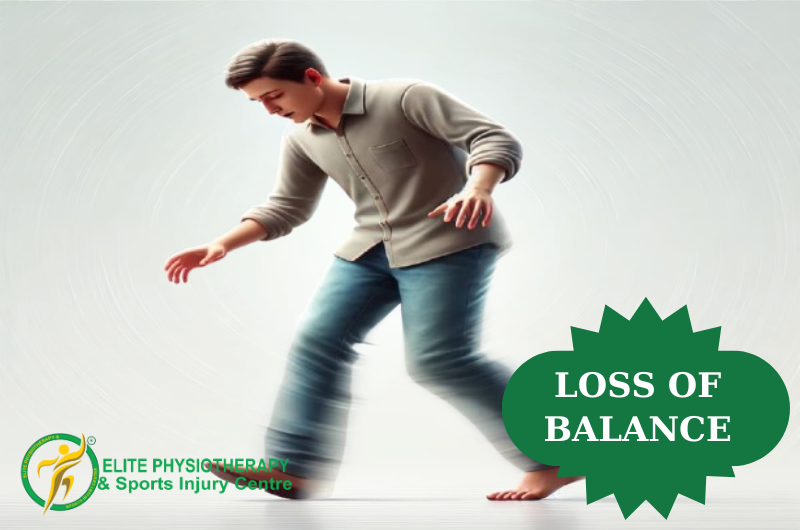
Loss Of Balance
At Elite Physiotherapy and Sports Injury Centre, we take great satisfaction in offering patients all-encompassing care to aid in their recovery from a range of physical challenges, including balance issues. We answer frequently asked questions about the signs and causes of losss of balance below.
Questions
What are the primary symptoms of loss of balance?
Different manifestations of loss of balance might occur depending on the underlying reason. The main signs and symptoms consist of:
1. Vertigo or dizziness: The feeling of whirling, either in your environment or in yourself.
2. Unsteady walking is the inability to walk straight forward or the sensation that you may topple over.
3. Frequently tripping or falling: An abrupt or persistent loss of balance that results in falls.
4. Feeling weak or "blacking out" without actually falling is called lightheadedness.
5. Disorientation is the state of not knowing where you are in space.
6. Vomiting or nausea: Frequently accompanied by vertigo and lightheadedness.In order to develop specialized treatment programs, we at Elite Physiotherapy evaluate the entire spectrum of symptoms.
Why do people experience loss of balance?
Loss of balance can occur for a number of causes, including:
1. Vestibular disorders: Issues with the inner ear, such as Meniere's disease or labyrinthitis.
2. Joint instability or muscle weakness: These might be brought on by age, trauma, or neurological disorders.
3. Neurological diseases: Balance can be affected by conditions like multiple sclerosis, Parkinson's disease, or stroke.
4. Side effects of medication: Certain medications may result in lightheadedness or shaky gait.
5. Visual disturbances: Spatial orientation may be impacted by changes in eyesight or poor vision.
6 .Postural hypotension: A dip in blood pressure that can cause lightheadedness when rising up too rapidly.We at Elite Physiotherapy and Sports Injury Centre are qualified to treat each patient individually and address the underlying causes of balance problems.
Who is at risk of losing balance?
Those who are in risk include:
1. Senior citizens: Diminishing muscular strength and diminished sensory abilities with age may be a factor in balance issues.
2. Recovering athletes from injuries: While they heal, athletes with injuries to their ankles, knees, or hips may have trouble balancing.
3 .Individuals with heart or neurological disorders: This includes people who have had inner ear infections or who have recovered from a stroke.
4. Post-operative patients: These include individuals recovering from lower limb procedures.
All of these groups receive specific therapy from our skilled physiotherapists, who help them recover confidence and stability.How can Elite Physiotherapy help with loss of balance?
At Elite Physiotherapy and Sports Injury Centre, our approach to treatment includes:
1. Comprehensive evaluations: We examine your balance and identify the source of the issue using cutting-edge methods.
2. Vestibular rehabilitation: We provide specific exercises that assist improve coordination and lessen dizziness for balance difficulties connected to inner ear issues.
3. Strength and stability training: The goals of these regimens are to enhance joint stability and regain muscular strength in order to promote improved balance.
4. Postural training: We walk patients through activities that improve posture, improve balance, and lower their risk of falling.
5. Sport-specific rehabilitation: To assist players reach their maximum potential again, we make sure their balance recovery is customized for their particular sport.What are some signs that I should seek help for my balance issues?
You should consider seeking professional help if you:
1. Experience frequent vertigo or dizziness.
2. Have a lot of falls or near-falls.
3. Have trouble keeping a straight gait.
4. Feel regularly dizzy or confused.
5. Have problems with balance after surgery or an accident.Our staff at Elite Physiotherapy and Sports Injury Centre is prepared to help you recover if any of these symptoms seem familiar to you.
